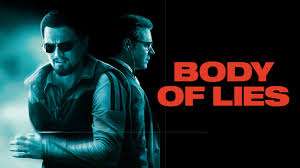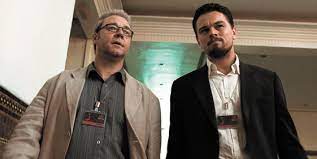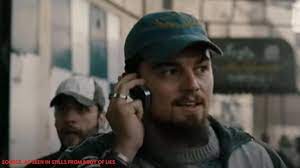In the modern world of counterterrorism, truth is malleable, morality is murky, and no one emerges clean. Body of Lies, Ridley Scott’s 2008 geopolitical thriller, embraces this ambiguity in a story that is as much about intelligence operations as it is about the consequences of deception. Based on the novel by David Ignatius, the film dives headfirst into the complex relationship between field agents and bureaucrats, between East and West, and ultimately, between what’s right and what works.
Anchored by committed performances from Leonardo DiCaprio and Russell Crowe, and shot with Scott’s signature polish and tension, Body of Lies offers a sobering look at the modern spy game. It might not reinvent the genre, but it sharpens its edges and raises pointed questions that are disturbingly relevant even today.
Plot: Lies Within Lies
Roger Ferris (Leonardo DiCaprio) is a CIA operative stationed in the Middle East, tracking a rising terrorist cell led by the elusive Al-Saleem. Operating largely in Jordan, Ferris is on the ground, in danger, making gut decisions in real time. But every move he makes is overseen—often manipulated—by Ed Hoffman (Russell Crowe), his superior at Langley, who coordinates operations via phone while chauffeuring his kids to soccer practice and grilling burgers in his backyard.
Ferris finds himself caught in a triangle of mistrust between his remote boss and Hani Salaam (Mark Strong), the suave but ruthless head of Jordanian intelligence. While Ferris wants to do good—targeting terrorists with precision and building local relationships—Hoffman is content to use people as pawns, and Hani demands absolute honesty, an impossible standard in the world of espionage.

To draw out Al-Saleem, Ferris concocts a fictional terror network, complete with fake operatives, forged intel, and staged media leaks. It works—too well. As the lies spiral out of control, so does the fallout. Ferris is forced to confront the personal cost of deception in a world where every truth has a shelf life.
Leonardo DiCaprio: The Human Face of the War on Terror
DiCaprio is superb as Ferris, portraying a man both hardened by war and burdened by a conscience. Unlike many cinematic spies, Ferris isn’t a cold killer or a charming playboy. He’s tired, injured, and constantly calculating. DiCaprio brings raw energy to the role, selling the physical toll of his work as well as the moral conflict brewing beneath his surface.
There’s a particularly striking tension in his interactions with Aisha, a Jordanian nurse he begins to care for. These quieter moments contrast with the chaos around him and remind us that Ferris, unlike the bureaucrats at home, still believes in the people caught in the crossfire. His choices aren’t just strategic—they’re personal.

Russell Crowe: Detached and Dangerous
Russell Crowe’s Hoffman is an equally compelling foil—bloated, sarcastic, and disturbingly casual about drone strikes and betrayals. Hoffman represents the armchair strategist, the puppet master who values efficiency over ethics. Crowe gained significant weight for the role and plays Hoffman with a disconcerting cheeriness that masks his callousness.
There’s brilliance in the way Scott contrasts the two men: Ferris, sweating in the desert, trying to build trust; Hoffman, munching on fast food, issuing orders with zero skin in the game. Their phone conversations—often shot in split-screen—perfectly capture the distance between intel and action, policy and people.
Mark Strong Steals Scenes
Though DiCaprio and Crowe dominate the marketing, it’s Mark Strong as Hani Salaam who arguably steals the show. With slicked-back hair, tailored suits, and chilling composure, Hani is a force to be reckoned with. He insists, again and again, that “never lie to me,” making his relationship with Ferris both precarious and fascinating.
Strong’s performance is magnetic—quiet power laced with menace. He’s not a caricature of Middle Eastern leadership but a careful portrait of a man balancing tradition, pride, and realpolitik. His presence adds a critical layer of cultural complexity to a film that might otherwise risk an overly Western lens.

Ridley Scott’s Direction: Brutal Beauty
Ridley Scott brings a kinetic style to Body of Lies, blending action and atmosphere without losing narrative clarity. The film moves swiftly between Iraq, Jordan, Washington, and Dubai, each location distinct and immersive. The handheld camerawork adds urgency, especially in the chaotic chase scenes and tense interrogations.
But Scott also knows when to slow down. In the scenes between Ferris and Aisha, or Ferris and Hani, the camera lingers, allowing character to deepen. It’s in these quieter exchanges that the film’s themes of trust and betrayal take root.
The violence, when it erupts, is brutal but never gratuitous. Explosions are quick and horrifying, not glorified. Torture is alluded to, not lingered on. Scott wants to entertain, yes, but also provoke thought.
Themes: Morality vs. Strategy
Body of Lies asks pointed questions: Can you win a war based on deception? How do you maintain morality when every relationship is built on leverage? Is intelligence gathering inherently unethical, or is it the execution that corrupts it?
Ferris’ growing disillusionment mirrors the viewer’s. We begin by rooting for him to “catch the bad guy,” but by the end, we realize the line between good and bad is largely irrelevant when the entire system is built on manipulation. The film doesn’t preach, but it certainly warns.
Criticisms: Dense and Demanding
The film’s major flaw is also part of its integrity—it’s dense. With its shifting alliances, foreign names, acronyms, and fast-moving plot points, Body of Lies demands attention. It’s not a popcorn thriller, and casual viewers may find themselves lost or detached.
The love story between Ferris and Aisha, while offering a necessary emotional anchor, sometimes feels undercooked. It’s meant to humanize Ferris, but its development feels rushed compared to the rest of the plot.
Final Verdict: 8/10
Body of Lies is a smart, hard-edged spy thriller that trades sleek escapism for geopolitical grit. Powered by a strong cast and Ridley Scott’s assured direction, it holds a mirror to the shadowy compromises behind global security. It’s not a comfortable watch—but it’s a rewarding one.
For viewers interested in the real cost of intelligence work and the emotional wreckage left in its wake, Body of Lies is a gripping, sobering experience. The lies may be fictional, but the truths it uncovers feel all too real.





